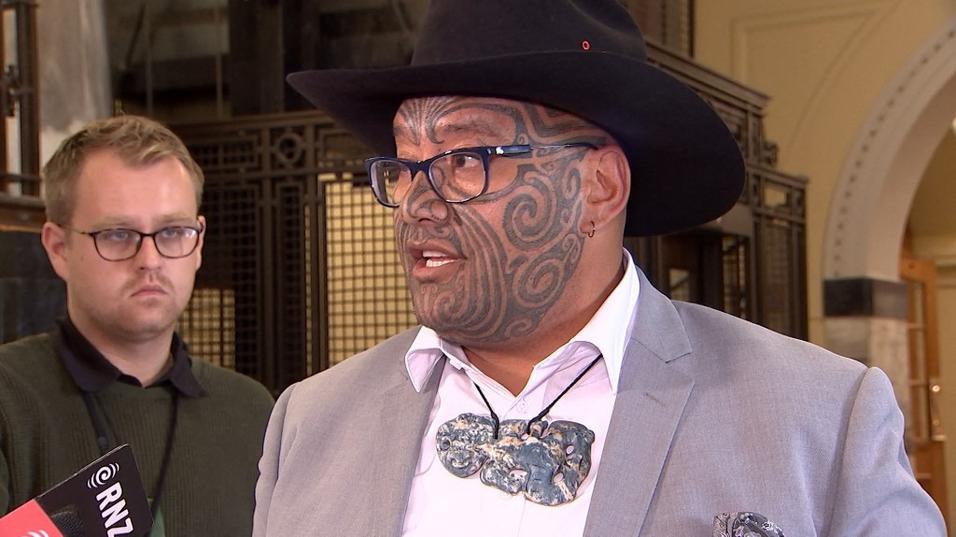 This television frame grab taken from TVNZ television on Feb 9, 2021 shows co-leader of New Zealand's Maori party Rawiri Waititi speaking to the media in Wellington after being ejected from parliament for refusing to wear a necktie, wearing instead a hei-tiki, a traditional gemstone pendant, in a move he said was forcing indigenous people to wear a "colonial noose". (TVNZ / AFP)
This television frame grab taken from TVNZ television on Feb 9, 2021 shows co-leader of New Zealand's Maori party Rawiri Waititi speaking to the media in Wellington after being ejected from parliament for refusing to wear a necktie, wearing instead a hei-tiki, a traditional gemstone pendant, in a move he said was forcing indigenous people to wear a "colonial noose". (TVNZ / AFP)
WELLINGTON - A New Zealand Maori leader who was ejected from parliament this week for refusing to wear a necktie in the chamber said forcing him to a Western dress code was a breach of his rights and an attempt to suppress indigenous culture.
Speaker Trevor Mallard twice prevented Rawiri Waititi from asking questions in the debating chamber on Tuesday, insisting that MPs could only ask a question if they were wearing a tie.
Waititi, who has called ties “a colonial noose,” was told last year that he would be ejected from the House if he did not wear one
Waititi, 40, who became an MP for the first time in the election last October, was wearing a taonga, a Maori greenstone pendant instead.
When Waititi continued with his question after being stopped a second time, Mallard ordered him to leave.
“It’s not about ties, it’s about cultural identity, mate,” Waititi said as he exited the chamber.
READ MORE: Britain expresses 'regret' for killing Maori 250 years ago
Speaker Mallard said that while ties were outdated in his view, an overwhelming majority of members asked that the rule be retained in consultations on the issue in the last few months.
The incident kicked off a debate about colonialism in New Zealand, and sparked outrage from around the world with #no2tie soon trending on Twitter.
Speaking to Reuters on Wednesday, Waititi said he was not surprised by the treatment of the speaker as Maori people had been facing this type of treatment for hundreds of years.
“Maori have not been treated equal in its own country and indigenous people all over the world have been subjected to discrimination due to racist systems that keep our peoples in second place,” he said.
The incident kicked off a debate about colonialism in New Zealand, and sparked outrage from around the world with #no2tie soon trending on Twitter
“For us to stand up against subjugation, to stand up again assimilation, to stand up against those who try and make us look, feel, make us think like they want us to think ... this was standing up against that.”
Waititi wore the same attire to parliament on Wednesday and this time he was permitted to speak
“The noose has been taken off our necks, and we are now able to sing our songs,” Waititi said in the interview.
The New Zealand parliament is the most inclusive ever elected in the country. Nearly half of the 120 seats in parliament are held by women.
It has a 11 percent LGBTQI representation and 21 percent Maori representation. The parliament saw its first MP of African origin and of Sri Lankan origin after the election last October.
Waititi, who has called ties “a colonial noose,” was told last year that he would be ejected from the House if he did not wear one. On Tuesday he wore a taonga, a Maori greenstone pendant, instead.
Maori are over-represented in prisons, majority children in state care are Maori, and poverty and unemployment are rife in the community.
ALSO READ: NZ inquiry finds up to 256,000 abused in state, faith-based care
Asked to comment, Prime Minister Jacinda Ardern said that it was not something she had a strong opinion on, and that she had no objection to someone wearing a tie in parliament or not.
“There are much more important issues for all of us,” Ardern said.


